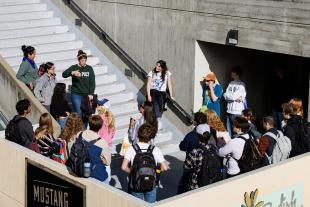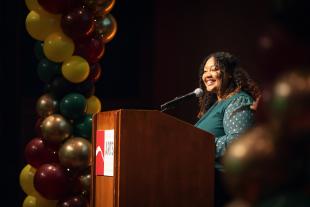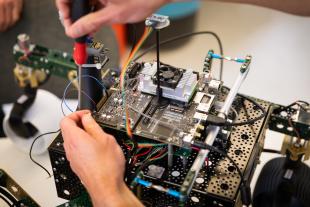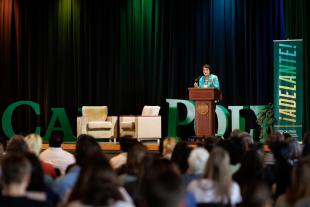Equity-Focused Faculty Make Waves through New Classes, Mentorship and More

In the last several years, Cal Poly has welcomed a special group of faculty members to campus. While they study different topics — everything from history to architecture to public health — they have one thing in common: they use their scholarship, teaching and service to illuminate the ways that diversity and inclusion intersect with their field of study.
The educators came to the Central Coast through two cluster hire programs focused on welcoming educators who look at their disciplines through a lens of diversity, equity and inclusion. The first universitywide effort happened in 2019, following one specific to the College of Liberal Arts in 2017. These 20 enthusiastic thought leaders publish meaningful research, lead critical discussions in the campus community, and inspire a new generation of Mustangs to work for a more equitable world.
On Feb. 11, twelve of these faculty members stepped up to lead 15 sessions — roughly one third of all sessions — during Cal Poly’s College of Liberal Arts' fifth annual Social Justice Teach In.
“I think that that really speaks to some of the efforts that the university has been working toward as a whole to bring expertise to us,” says Jennifer Teramoto Pedrotti, who is associate dean for Diversity and Curriculum in the College of Liberal Arts, a member of the Cluster Hire Steering Committee and one of the Teach In's organizers. “That expertise is now coming back to us in wonderful ways.”
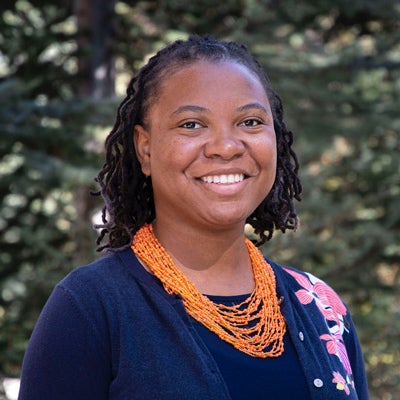
Joni Roberts, professor of kinesiology and public health, spoke at three sessions, including an eye-opening talk on menstrual health management in low resource countries. She presented findings from her work in Uganda, where the scarcity and stigma of menstrual products correlates to increased rates of infection that can lead to cervical cancer.
“I knew that women in other countries experience menstruation much differently than our society does, but the stigma around it really struck me,” said one student after the session.
The topic of menstrual health management sits within Roberts’ broader research on disparities in health care associated with cultural beliefs and bias, specifically focusing on women.
“We can’t create change unless we know what needs to be changed,” says Roberts, who has studied and gathered data on female health care in communities in the American South and Malawi as well. “We have a lot of data that tells us either people are or aren’t [seeking care]. What we don’t know is the ‘why.’”
Roberts says the “why” goes beyond demographic data points to weave in cultural traditions, geographic location, and decision-making authority within a family structure. She teaches multicultural and global health classes while leading a team of students researching how self-perception of adverse effects of birth control methods can influence contraceptive choice among young adults.
“[Previous to Cal Poly], I was at a historically Black college and university with a larger minority population; things that I knew were culturally relevant were sort of the norm among the student population,” she says. “Here, I’m spending more time educating my students and research team about things that they may not have considered and how it affects others.”
And while some topics aren’t currently in Cal Poly’s course catalog, several faculty in the cluster hire cohorts are working to change that by creating new courses to foster a richer education for students.
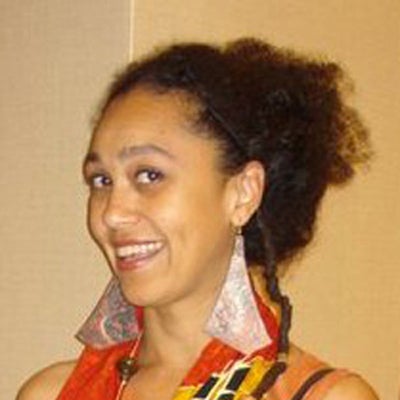
One of those is professor Thanayi Jackson of the History Department, who’s developing a course on African-American activism. She plans to survey historical movements alongside 2020’s many watershed moments: the pandemic, the election, the economic downturn and anti-racist activism.
“I seriously think that I’m in this business because, hopefully by just keeping this conversation on the agenda, one of these young people are going to come up with something amazing,” Jackson says. “I have faith.”
The new course builds on the curriculum of her African-American history course, where she shares her research findings on racialized branding among political parties. Jackson’s scholarship digs into party rhetoric after the Civil War that established a dichotomy between Black and white people within the political party system.
Meanwhile, in the College of Architecture and Environmental Design, Padma Maitland recently developed a new course called Imagining the Global South, which builds on his research on modern Buddhist art and architecture in India, specifically the roles of Buddhist structures in culture, society and politics.
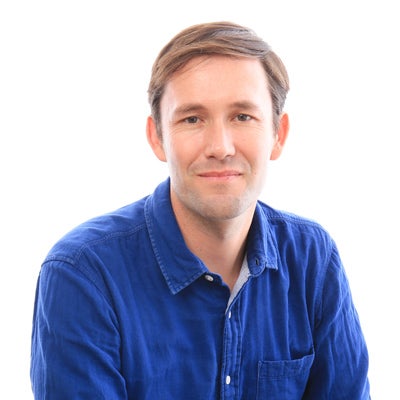
The course’s curriculum challenges students to consider how the geographic and architectural contours of “Asia” came to be represented: first in European maps, and then in buildings and histories primarily designed by Europeans. The class traces the effects of colonial practices in countries like India and how it led to styles of architecture that conveyed colonial authority and power as well as postcolonial efforts to define a modern aesthetic for newly independent nation-states.
“We spend a lot of time in my class talking about the phrase that architecture is not neutral,” Maitland said. “It’s an important conversation to have with a group of architecture students; to say that what we’re doing, what we’re studying, what we’re practicing, what we’re designing, what we’re thinking doesn’t happen in a vacuum. It’s not meaningless.”
Outside the classroom, several faculty are empowering the next generation of academic researchers through the BEACoN Mentors program. The program matches dozens of budding scholars from underrepresented backgrounds with faculty members who have an ambitious project to tackle — everything from aircraft design to soil health to artificial intelligence. The program not only supports students financially, it fosters critical mentorship between students and faculty that strengthens relationships across campus.
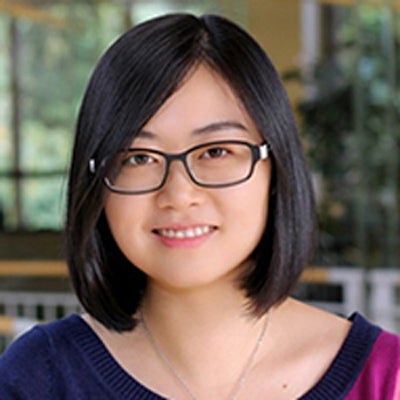
Cindy Wang, professor of marketing, sponsored a BEACoN project related to consumer decision making, which ties closely into her research on how marketing messages affect consumers from different backgrounds. One of her recent publications focused on how a consumer’s perception of their own power affects consumer decision making.
“Consumers make healthier choices when feeling powerful,” said Wang, who found the effect is more pronounced among consumers with low socioeconomic status.
She’s working with students on what messages prompt positive feelings and action when learning about pro-social causes, including environmentally friendly behavior and charitable donations.
Collectively, these exceptional faculty are finding measurable ways to make an impact on every corner of campus, helping Cal Poly foster a better learning environment for everyone.
“I think one of the best things that a class can offer is a shift in perspective, a little bit better understanding of all the tendrils that are linked,” Maitland says of his architecture courses, though it rings true for the perspective that equity-focused faculty are bringing to the Cal Poly learning community. “If we start to untangle those tendrils, we can understand our own place and the way we have agency to make a difference.”
Read the profiles of six cluster hire faculty members in the first and second installments of Thought Leaders, an ongoing series of faculty spotlights in Cal Poly Magazine.

